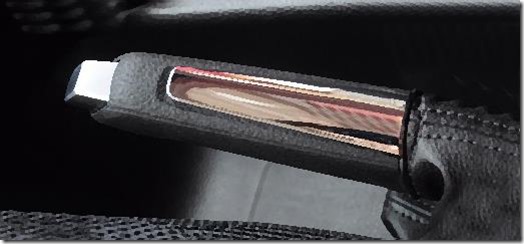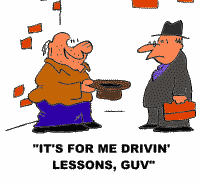This is a very old post.
I noticed someone was asking about pupil dropout rates – where someone starts taking lessons, then stops and you never hear from them again. They were worried that they might be doing something wrong.
The first thing is: it happens! Anyone who claims they don’t get any dropouts is being economical with the facts. But what are the reasons for it when it happens?
There’s no single reason, and in most cases it’s a complex mix of factors. Let’s consider a few of them.
I can’t afford the lessons
It doesn’t matter whether you’re a cheapo offering stupid lesson prices, or a canny business operator who charges the going rate. If someone can’t afford lessons then  there is always a risk they’ll disappear completely at some point. Some instructors are so far out of touch with reality that they simply cannot understand how someone without a job and very little money is often going to turn out to be unreliable and highly likely to not be able to afford lessons at all at some stage.
there is always a risk they’ll disappear completely at some point. Some instructors are so far out of touch with reality that they simply cannot understand how someone without a job and very little money is often going to turn out to be unreliable and highly likely to not be able to afford lessons at all at some stage.
Perhaps understandably, those who are so close to the breadline – and who see being able to drive as a means to gaining employment – are often embarrassed by their predicament and if they stop lessons at some point, some of them won’t come back to you when they start again. The unfortunate fallout from this is that they’re not going to tell their new instructor the truth and will concoct some reason for having switched instructors. Work out for yourself what possible reasons they could give that don’t involve them telling the real story.
I don’t like the lesson prices
Not quite the same as above. In my experience, people in affluent areas can be very bad for this. They live in huge houses, have three cars on the drive (at least two of which will be Mercedes or other top marques), and absolutely detest paying for driving lessons for their offspring. They’re also the ones most likely to start a conversation with you involving how they only had six lessons before they passed, or attempting to negotiate “a deal” (i.e. lower prices).
In a lot of these cases, it is the pupils themselves who are financing lessons through the handful of hours of low-paid work they do after school. Maybe mum and dad are trying to teach them how they have to earn their way through life. But either way, your hold on them could be tenuous if they resent having to pay you.
I don’t get on with my instructor
This is a tricky and very complex one. Assuming that you aren’t a complete arsehole in the car, the amount of baggage some pupils carry around with them is unbelievable. Angst-ridden teens are always ready to blame the world for their own shortcomings, whilst simultaneously holding on to the belief that they know more than the rest of the world put together. If you press the wrong buttons – and sometimes, pressing ANY button is the wrong thing to do – they could be history.
I remember a few years ago teaching a girl who was a nightmare in the car – she just would NOT talk, even with the most extensive prompting. It was impossible to hold any sort of conversation. I know it wasn’t anything I was doing wrong, but according to her mum (after I’d questioned this to see if there were any known issues) she was the “life and soul” when she was with her friends. Honestly, there was no way that could be true (parents are nearly always defensive about their kids), but you can’t help questioning your own approach when you get someone like this. Anyway, I got her through her test (2nd time) and later discovered she was doing Pass Plus – with another school, because she “wanted a female instructor”. I suspect the amount of prompting I had to do might have been part of the reason she said that, but it still doesn’t hide the fact that she had serious communication problems from Day One. And I dread to think what she was telling that female instructor about me!
I want a female (or male) instructor
I have to be honest, but this one does hurt. You’ve got to wonder why someone would be so stupid as to choose a male (or female) instructor, only to want to change for precisely that reason a few weeks later. It can be a particular (albeit less worrying) problem with non-UK nationals (particularly Muslims). I had one Muslim woman who needed a chaperone on her lessons (her husband or daughter), and who had to change to a female instructor because of the restrictions it placed on her availability for lessons. There were no hard feelings on either side – it was just something that had to happen. And Muslim males – especially older ones – sometimes resent being taught by female instructors, but this doesn’t seem to be as common as it once was.
As I said above, though, I worry what stories they tell their next instructor. I’ve picked up loads of pupils with what I’d consider to be ”serious issues”, and not one of them has ever said it was their fault they left their last instructor.
To be honest, if I went solely on the bad stuff I’ve heard from female pupils I’ve taken on over the years I’d have to conclude that over 90% of males on the ADI Register are “pervy”, “creepy”, “dirty”, and so on. Statistically, that doesn’t give me much chance, does it?
I want an older instructor
Older learners – especially non-UK ones – sometimes resent being taught by instructors who are younger than their own kids. I’ve never come across the opposite case of someone wanting a younger instructor, though if you ARE a younger instructor I’m sure you can convince yourself its some sort of selling point.
I don’t really want to learn to drive
This might seem surprising, but many young people are either pushed into learning to drive by t heir parents (or boyfriends/girlfriends), or think that they’ve just “got to do it” for some reason. The only drawback is that they don’t really want to, and it is therefore easier for them to come up with reasons to skip lessons and eventually just stop altogether.
heir parents (or boyfriends/girlfriends), or think that they’ve just “got to do it” for some reason. The only drawback is that they don’t really want to, and it is therefore easier for them to come up with reasons to skip lessons and eventually just stop altogether.
As an ADI, I find it disconcerting to encounter a pupil who isn’t enthusiastic – and is never going to be. I had one last year who said “I don’t really want to learn to drive, and I don’t like driving, but I want to get it out of the way before I go to University in October”. We managed to get one test in, which he failed, and I haven’t heard from him since. No doubt his failure was my fault.
Another aspect of this problem involves older learners. These are sometimes far more nervous or self-critical. The nerves affect their enjoyment. Being overly critical of themselves can make them think they aren’t going to learn, and that can lead them to stop taking lessons. Of course, if someone tells them it’s their instructors fault they can’t learn, they could decide to jump ship.
I wasn’t getting anywhere
Another tricky one. If I pick up a pupil who has had maybe 10-20 hours of training but only covered quiet roads and none of the manoeuvres I’m immediately surprised. I rarely get pupils of my own – even those with huge sacks of “issues” to lug around, and no innate driving skills at all – who I don’t get out on to main roads and turning the car around within a few lessons (a turn in the road in a quiet industrial estate teaches a lot about clutch control and awareness of other if used properly). In the cases where those I pick up are actually normal, and can learn quickly, there must be something in their complaint about not progressing.
On the other hand, if there are “issues” and lack of driving skills, then some people WILL progress less quickly than others. The average 17-year old male “knows” that it only takes 10 hours to learn to drive because his dad said so. Or sometimes it will be his best mate, who has been stealing cars and driving illegally since he was three, and who passed first time after only a handful of lessons (but who had been learning “unofficially” for the previous 10 or more years). Or maybe again it will be a few gallons of extra testosterone resulting in someone who took 50 hours claiming only 20 (young males do that, believe me). So the fact that he has never driven before, and then turns out not to be a natural driver, tends come as a bit of a disappointment.
As I mentioned above, older drivers often expect to be able to achieve things more quickly than they’re capable of. Don’t get me wrong – some learn faster than some 17-year olds, and some learn as fast as most 17-year olds – but it tends to be harder to learn new skills as you get older for most people.
My instructor [fill in the blanks with some alleged behaviour]
You can have shouting – that one comes up a lot. I’ve mentioned before that shouting is in the ear of the listener. I don’t shout AT them (well, I did once), but if I’m on a lesson and we’re driving at 70mph on a dual carriageway, and we start to drift towards the kerb, another car, or a tree lying in the road, then I will raise my voice. How much depends on how terrified I am by the impending catastrophe. I’m not shouting at them, but if they think I am it’s their problem. My life counts for more than their fragile and confused emotional states, I’m afraid
I’ve had more than one conversation over the years which has gone something like:
“You make me nervous when you shout.”
“You were already about to hit that bus before I’d even opened my mouth. YOU scream or panic when you’re on a scary ride at the funfair, don’t you?
“If I am that frightened by something, I AM GOING TO RAISE MY VOICE whether you like it or not. It is my way of screaming in terror before I try and sort it out.”
Then there are the allegations about behaviour – I’ve already mentioned the “creepy” and “pervy” ones, but you’ve also got “stopping and talking for ages”, “talking about his/her private life”, “stopping for a smoke”, “smoking in the car”, “finishing lessons early”, “turning up late”, “cancelling lessons”, and so on. I’m sure you could add many others to this list.
You just have to remember that even though all things to do with driving might be your lifeblood as in instructor infatuated with cars, the whole learning to drive thing probably doesn’t even make it on to the top fifty for 90% of teenagers. Some of them are still mentally kids (you can often tell this from where you pick them up and drop them off – one of mine often gets dropped off near a sports field where she and a gang of her mates (and boyfriend) hang around smoking), and God help you if one of them falls in “love” while they’re taking lessons! Driving lessons disappear off the radar when that happens. Others might be more mature, but they are still young and have young people’s priorities – like work, University, and so on.
And the problem of dropout is going to vary by area. If you work in deprived areas, money is always going to be an issue, for example. If you work in more affluent locations, University will always be on the horizon.
So what should you do? Well, if you’re sure it isn’t you (and I know it isn’t me when it happens), just forget about them. Chasing them makes it look like you’re desperate for work, and even if they come back they’ll still be unreliable. It’s your choice, though.
But as I said right at the start. It happens.

 This is an old post. Some of the examples are out of date, but the message is still the same.
This is an old post. Some of the examples are out of date, but the message is still the same.


 However, what people may not realise is the sudden spawning of a million wannabe-Bradleys who haven’t got a clue what they’re doing. The number of ageing Spandex boys out on the roads yesterday was dramatically greater than usual. And it has carried over into today.
However, what people may not realise is the sudden spawning of a million wannabe-Bradleys who haven’t got a clue what they’re doing. The number of ageing Spandex boys out on the roads yesterday was dramatically greater than usual. And it has carried over into today. out it. This morning, even they started on about the wannabes – apparently they’re known as MAMLs – Middle Aged Men in Lycra – so I’m not the only one to have noticed this copycat behaviour (though I did observe it
out it. This morning, even they started on about the wannabes – apparently they’re known as MAMLs – Middle Aged Men in Lycra – so I’m not the only one to have noticed this copycat behaviour (though I did observe it  there is always a risk they’ll disappear completely at some point. Some instructors are so far out of touch with reality that they simply cannot understand how someone without a job and very little money is often going to turn out to be unreliable and highly likely to not be able to afford lessons at all at some stage.
there is always a risk they’ll disappear completely at some point. Some instructors are so far out of touch with reality that they simply cannot understand how someone without a job and very little money is often going to turn out to be unreliable and highly likely to not be able to afford lessons at all at some stage. heir parents (or boyfriends/girlfriends), or think that they’ve just “got to do it” for some reason. The only drawback is that they don’t really want to, and it is therefore easier for them to come up with reasons to skip lessons and eventually just stop altogether.
heir parents (or boyfriends/girlfriends), or think that they’ve just “got to do it” for some reason. The only drawback is that they don’t really want to, and it is therefore easier for them to come up with reasons to skip lessons and eventually just stop altogether.